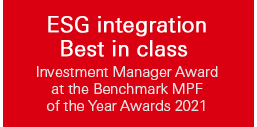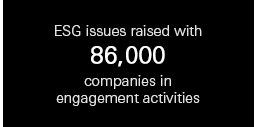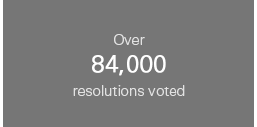Stewardship is a powerful tool for change.
Our voting and engagement activities are focused on protecting and enhancing value in the companies in which we invest on behalf of our clients.
We expect the directors of the companies in which we invest to provide effective management and to ensure that the company acts in the interests of all shareholders and other stakeholders. We believe each company should:
- Apply governance standards that are considered good practice in the market in which they are listed; and
- Manage the environmental and social issues associated with their activities in a sustainable and responsible manner.
Engagement
Engagement – constructive dialogue with company management or board members – is a fundamental part of our stewardship activity. We engage to improve our understanding of companies, to raise our concerns, to encourage good practice, and to understand the extent to which management is delivering sustainable returns to shareholders. We do this with the aim of protecting and enhancing long-term value for our clients.
Our engagement activity is undertaken in a variety of formats including in-person meetings, site visits, letters, phone calls, and attendance at annual general meetings. Our Engagement Policy sets out further details of our approach.
Voting
We believe high standards of corporate governance help companies deliver sustainable returns to shareholders. In our dealings with investee companies, and in our voting, we encourage adherence to international and local best practice standards in corporate governance.
Our voting is founded upon our Voting Guidelines, which aim to protect investors’ interests and foster good practice.
Stewardship aims to improve risk-adjusted return of investment through positive change outcomes. We engage with a range of stakeholders in the society to support better long term sustainable outcomes for the investors we serve.
How can stewardship add value?
- Driving growth: In understanding how companies and issuers manage their stakeholders and ESG challenges, we spot visionary companies with the potential to grow and encourage others to adopt industry best practices.
- Managing dynamic materiality of risks: We engage early with companies to help them navigate the dynamic risk landscape, protecting the value of assets, nature and people.
- Improving transparency and disclosure: We inform companies on the rapidly changing disclosure and reporting landscape, and encourage them to disclose more effectively on important topics.
Key differentiators
How do we engage?
- Research and analysis: we critically analyse companies through three key lenses (growth, risk and disclosure) that cover material and salient environmental, social and governance issues.
- Company engagement: we engage with board members, executive management and subject experts to ensure companies are future-fit with long term financial sustainability. Our engagements are objectives-led with a six milestones tracking process.
- Voting: we leverage voting rights to reward positive corporate development, drive behavioural changes, and hold company directors accountable when they fail to meet our expectations.
- Clear escalation approach: We have in place a well established escalation procedure with a range of engagement tools and methods guided by industry best practices.1
- Public policy engagements: we engage with policy makers and standard setters to support the integrity of the market and share industry best practices.
1: Professor Robert Eccles et al (2021) Value Creation of Active Engagement (English and Chinese versions available, City of London UK-China Green Finance ELF Forum. HSBC is a co-author.
Our impact in numbers
Source: HSBC Asset Management, data as of December 2021. The information contained in this publication is not intended as investment advice or recommendation.
2022 engagement themes #WeEngage
Climate change
Our objectives and approach to addressing climate change issues align with our Climate Change Policy published online. We cover both low carbon and just transition under this theme.
Our position
As a signatory of the Net Zero Asset Managers Initiative, we have committed to work towards the target of net zero emissions across all assets under management (AUM) by 2050 or sooner, which is in line with global efforts to limit warming to 1.5°C above pre-industrial levels in the same time frame. We support a just transition where we engage with issuers to ensure that impact assessments on workers, supply chain, communities and consumers are taken into consideration of their net zero transition plans.
Our actions
- We have been involved in the Climate Action 100+ since its inception and will continue to lead engagement with companies, especially those with long and complicated supply chains.
- We continue our involvement in the CDP non-disclosure campaign, and are actively engaged in discussion with International Financial Reporting Standards (IFRS) Foundation and the International Sustainability Standards Board (ISSB) on financial and sustainability reporting with a strong focus on climate change related disclosure.
- We have existing commitments to engage with issuers exposed to thermal coal extraction and power generation. An open letter addressed to all thermal coal company outlining our expectations will be available on our website.
- Through engagement, we encourage companies to set interim targets on achieving net zero, improve their emission disclosures and provide ‘Climate Key Performance Indicators (“KPIs”) aligned with international best practices.
Biodiversity & nature
Our objectives and approach to addressing biodiversity and nature-related issues will align with our Biodiversity Policy published online.
Biodiversity as a term is broad, and as such we seek to focus on components contributing to its decline such as deforestation, soil health, water usage, and changes in land and sea. In addition, we also consider practices that could help drive positive change such as circularity by design and sustainable agriculture.
Our position
Biodiversity and natural systems health are absolutely integral to planetary sustainability, and a narrow focus on climate change and carbon emission is not enough to create a resilient environment. We believe that humanity is already starting to experience the costs of ecosystem decline from our unbalanced relationship with the nature, and the Covid-19 public health crisis is just one example of the links between the exploitation of biodiversity and the emergence of zoonotic diseases. Companies that do not address biodiversity loss will face increasing risks over time – including physical risk, reputational risk, and systemic risk.
Our actions
- Participating in the Task Force for Nature Related Financial Disclosures (TNFD), at the HSBC Group and asset management level
- Developing a natural capital real assets investment business - Climate Asset Management (CAM)
- Being an early signatory of the Finance for Biodiversity Pledge, and participation in the ongoing working groups on engagement for biodiversity
- We are developing a list of high impact issuers, many of which are involved in the food, utilities, and materials sectors, where they have large biodiversity impact and significant dependence on nature. Our global engagement effort will be most focused on this list in the medium term.
Human rights
Our objectives and approach to addressing human rights issues align with HSBC Group’s Statement on Human Rights.
Our position
To fulfil our fiduciary duty and act as a responsible corporate citizen, we are committed to respecting and protecting human rights to the best of our abilities. We are guided by international principles and standards, encourage investees to adhere to the same guidelines not only within their operations, but also in subsidiaries and supply chain management:
- United Nations Universal Declaration of Human Rights (UDDR);
- International Labour Organization’s (ILO) labour standards;
- United Nations Guiding Principles for Business and Human Rights (UNGP);
- United Nations Global Compact (UNGC); and
- The OECD Guidelines for Multinational Enterprises (MNEs)
Our actions
We identify human rights violations using the Global Standards Screening solution from Sustainalytics, one of our third-party data vendors. Companies that are assessed as non-compliant in any of the UNGC principles are subject to our Enhanced Due Diligence (EDD) process on an annual basis, as a minimum, which requires investment teams to conduct further diligence on the company and to evidence engagement progress towards these issues, if any.
Diversity, equity & inclusion
Our objectives and approach to addressing DEI issues will align with the Diversity, Equity and Inclusion Policy published online .
Our position
Within HSBC Asset Management, we have established over ten work streams to promote all forms of diversity by theme and by function – gender, ethnicity, ability, LGBTQi+, mental health, social mobility, faith, working parents, commercial and investments. We seek to learn from our own experience to inform investees on how to address challenges related to DEI, from pipeline development, to best practices in fair hiring practices and talent management.
Our action
- We are a member of the UK Diversity Project and HSBC Group is a member of the 30 per cent Club, which is a part of the 30% club Hong Kong chapter. On workforce disclosure, we continue to support Share Action’s Workforce Disclosure Initiative (WDI) and encourage our investee companies to participate.
- We set stretching targets for board diversity in key markets. In addition to gender and ethnic diversity at the board level, we engage with companies on improving diversity throughout the organisation, from the executive team, to the way hiring is conducted at the entry level.
Inclusive growth & shared prosperity
Our objectives and approach to achieving inclusive growth and common prosperity also covers access to basic services: healthcare, finance and digital services.
Our position
As a trusted guardian, we believe more equitable growth is in the interest of clients, as more investment opportunities can be created. In the long term, inequality can create systemic risks, such as breakdowns in social cohesion and trust, disruptions to political stability, and undue financial system turbulence. Finally, we believe political and regulatory interest in achieving broad based shared prosperity is growing. The importance of this is something that the investment community is only just beginning to understand.
Our actions
We have developed a framework on remuneration that better captures our concerns and beliefs that shall promote inclusive growth and shared prosperity. We have decided to focus first on the US because the market has the highest absolute levels of pay in the world, as well as some of the widest disparities between executives and workers, and between executives and the national median income amongst the OECD nations. Our learning from the US market may inform work we do in other markets, such as the UK.
Access to healthcare
Our position
Access to healthcare is a basic human right and a sustainable development goal (SDG3). Up to this day, not everyone in developed countries have access to vital healthcare, not to say in developing countries. The Covid-19 pandemic has made the extent of this crisis abundantly and undeniably clear and investors have a role to play in narrowing this gap.
Our actions
- We are dedicated to sustainable healthcare and have established a thematic, impact driven sustainable healthcare fund to evidence our commitment and expertise.
- We are a member of the PRI Collaborative Engagement on Access to Medicine and SDG3.
- We encourage companies to systematically ensure that Research and Development (R&D) projects are paired with plans to increase access in developing countries, ensure responsible promotional practices and that policies are in place to address anti-bribery and corruption risks, product safety and supply chain management issues.
Tax transparency
Our position
We believe scrutiny of corporate tax arrangements is growing. This is due to the increased need for sustainable long term public finances, following significant public spending to secure populations during the Covid-19 pandemic. After many years of discussion and negotiation, the 136 nation members of the OECD reached an agreement in 2021 for a minimum tax rate of 15 per cent for large companies. We believe that the rate corporates pay in tax is a useful action-based indicator on how a company thinks about serving wider stakeholders.
Our actions
We identify unacceptably low tax payers, and payers who are spending heavily on tax avoidance strategies, which may conflict with their narratives on responsible corporate citizenship. We also take into consideration the proportion of audit fees spent on tax advice as an indicator.
Trusted technology and data
Access to information is a basic human right, and has proven to be a vital enabler for sustainable development in areas such as health, environment, alleviating poverty and fighting corruption.
Our position
With huge quantities of data and information being transmitted and/or stored on a daily basis, companies should proactively ensure trusted information is used and cybersecurity measures are in place. Companies have a responsibility to ensure that data collection, storage, mining and dissemination is undertaken responsibly and securely. Enhanced information security is a necessary and logical step in keeping pace with rapid digitization and safeguarding stakeholders against cyber attacks.
Our action
Through engagement, we encourage companies to reduce potential cyber risks and improve their overall information security. We assess investees’ cyber security level in aspects such as having in place information security insurance policies and regular review on algorithms.




